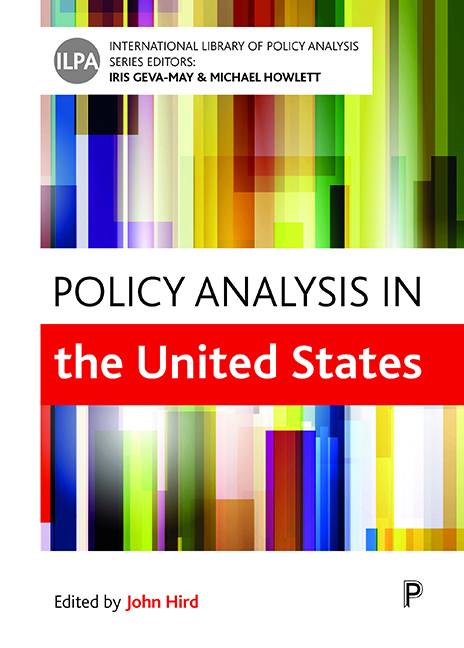Book contents
- Frontmatter
- Contents
- List of tables and figures
- Notes on contributors
- Editors’ introduction to the series
- Introduction
- Part One History, styles, and methods of policy analysis in the United States
- Part Two Policy analysis by governments
- Part Three Policy analysis outside of government
- Part Four Policy analysis education and impact internationally
- Index
Sixteen - Public policy education in the United States
Published online by Cambridge University Press: 12 April 2022
- Frontmatter
- Contents
- List of tables and figures
- Notes on contributors
- Editors’ introduction to the series
- Introduction
- Part One History, styles, and methods of policy analysis in the United States
- Part Two Policy analysis by governments
- Part Three Policy analysis outside of government
- Part Four Policy analysis education and impact internationally
- Index
Summary
Introduction
Policy analysis (i) predicts futures conditional on alternative policies’ adoption, (ii) estimates outcomes of interest for each policy, (iii) combines these estimates into a scalar (or at least dimensionally reduced) measure of social welfare, to (iv) inform political choice of a ‘best’ alternative. In that abstract form, it's what governments and their advisors have undertaken for all of human history, but as a formalized enterprise with specialized training and broadly accepted standard practices, it is the scope of professional education in graduate schools offering the Masters in Public Policy (MPP) degree, and has spread through older Masters of Public Affairs (MPA) programs and even more widely.
The present chapter reviews the practice of policy analysis education in the United States today. Because a national conference of the association of policy schools in 2006 commissioned a series of 10 papers and responses about this enterprise, in more detail and with much more attention and research than is possible here, the reader is referred to that set of works, published in the four 2008 issues (vol. 27) of the Journal of Policy Analysis and Management (JPAM) Curriculum and Case Notes section, for a deep dive into the current state of affairs, and discussion here will attend more to unsettled issues and developing trends.
History
The MPP schools have their roots in two main traditions. The first is the progressive-era public administration MPA programs, mostly situated in state universities, designed to provide competent, skilled, apolitical managers—mostly state and local—that (under the ‘political-administrative dichotomy’ model) would be designed and enacted by political processes. Most of these MPA programs endure today, but especially at the élite state schools, increasingly resemble MPP programs. The professional associations of these schools, the Association for Public Policy Analysis and Management (APPAM) and the one now called Network of Schools of Public Policy [ sic ], Affairs, and Administration (which still uses its former acronym NASPAA) have greatly overlapping individual and institutional membership. (See the chapter by Rubaii in this volume for more about NASPAA and APPAM.)
- Type
- Chapter
- Information
- Policy Analysis in the United States , pp. 297 - 318Publisher: Bristol University PressPrint publication year: 2018



